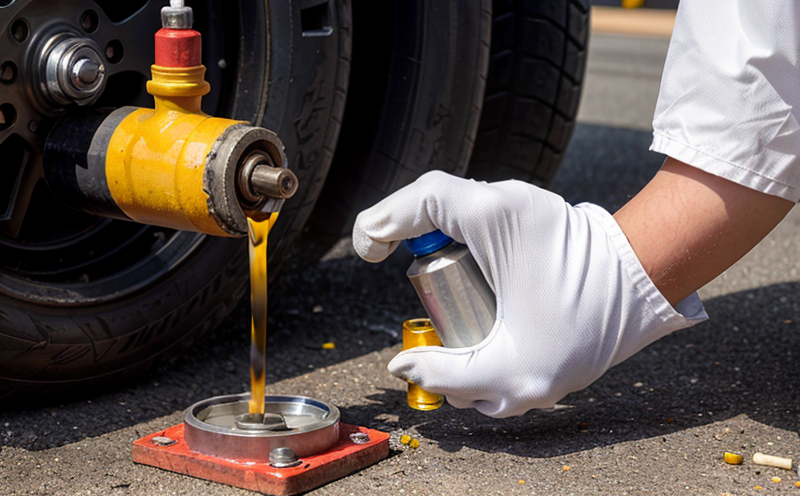ASTM D2896 Base Number Testing of Marine Oils
The ASTM D2896 standard is a widely recognized method used to determine the base number of lubricants, which indicates their alkaline reserve. This property plays a crucial role in ensuring that marine engines and equipment have sufficient protection against acid formation during combustion processes. In marine environments, where high-temperature operations are common, maintaining an adequate base number is essential for prolonging the life of engine components and reducing maintenance costs.
The test measures the amount of neutralizing agents present in a lubricant sample to counteract acidic compounds formed as byproducts of fuel oxidation. Base Number (BN) values range from 0 to over 25, with higher numbers indicating greater resistance against acid formation. For marine applications, maintaining BN levels above minimum recommended thresholds ensures optimal engine performance and extends the service life of critical components like cylinder liners, pistons, and exhaust valves.
The ASTM D2896 procedure involves titration using a standardized potassium hydroxide (KOH) solution. A precise sample amount is prepared according to the standard's requirements, then reacted with the KOH until the endpoint is reached, marking the neutralization point. The volume of KOH required directly correlates to the base number value.
Proper specimen preparation for ASTM D2896 testing requires accurate sampling techniques to ensure representative samples are analyzed. Samples should be collected from various points within storage tanks or distribution systems to account for potential variations in composition throughout the batch. Properly stored and handled, these samples must be free of contamination from external sources such as water, dirt, or other substances that could affect test results.
Instrumentation used in ASTM D2896 testing includes titration equipment capable of precise volume measurements and pH monitoring capabilities. Digital titrators provide accurate control over the addition of KOH solution while simultaneously recording the incremental changes in pH during the reaction process until reaching the endpoint.
The standard specifies acceptance criteria based on the BN value obtained from multiple replicate tests conducted under controlled conditions. These replicates ensure consistency and reliability of results, which is critical for making informed decisions regarding lubricant quality control and maintenance schedules. Compliance with these criteria helps maintain optimal engine performance while minimizing operational risks associated with insufficient base number levels.
Real-world applications of ASTM D2896 testing in marine environments highlight its importance across various sectors including shipping companies, naval forces, and offshore oil exploration operations. By ensuring that lubricant samples meet or exceed specified BN thresholds, these organizations can prevent premature equipment failure due to acidic corrosion and extend the operational lifespan of their fleets.
For quality managers responsible for oversight over fuel procurement processes, ASTM D2896 testing provides valuable insights into the condition of purchased lubricants. This information supports strategic decisions regarding supplier selection and contract negotiation based on consistent performance data. Additionally, R&D engineers benefit from this test by identifying potential improvements in formulation designs aimed at enhancing overall engine protection.
Compliance officers also rely on ASTM D2896 results to verify adherence to industry standards and regulatory requirements governing lubricant specifications. By validating BN values through rigorous laboratory testing, they ensure that all stakeholders involved understand the importance of maintaining proper levels within their respective systems.
Benefits
- Maintains optimal engine performance by preventing acidic corrosion caused by insufficient base number levels.
- Extends the operational lifespan of critical components like cylinder liners, pistons, and exhaust valves.
- Ensures compliance with industry standards and regulatory requirements governing lubricant specifications.
- Supports strategic decisions regarding supplier selection and contract negotiation based on consistent performance data.
- Provides valuable insights into the condition of purchased lubricants for quality managers overseeing fuel procurement processes.
Eurolab Advantages
At Eurolab, we pride ourselves on offering comprehensive marine equipment testing services tailored specifically to meet your unique needs. Our team consists of experienced professionals who possess extensive knowledge in both ASTM D2896 testing procedures and broader marine lubricant analysis.
We employ state-of-the-art instrumentation designed to deliver accurate results consistently across all samples processed. This commitment ensures that every test conducted adheres strictly to the specified criteria outlined within the standard, thereby providing reliable data upon which critical decisions can be made confidently.
Our laboratories maintain strict quality control measures throughout each stage of specimen preparation and analysis to minimize any potential errors or inconsistencies. By doing so, we guarantee accurate results that reflect true conditions found within your marine operations environment.
In addition to standard ASTM D2896 testing, Eurolab also offers advanced analytical techniques such as Fourier Transform Infrared Spectroscopy (FTIR) and Gas Chromatography-Mass Spectrometry (GC-MS). These additional capabilities allow us to provide more comprehensive evaluations of lubricant samples beyond simple base number determination.
Our experienced technical staff is dedicated to providing exceptional customer service throughout the entire testing process, from initial consultation through final report delivery. Whether you require routine monitoring or one-off assessments for specific projects, our team will work closely with you to ensure that your goals are fully met.
Customer Impact and Satisfaction
EuroLab's expertise in ASTM D2896 testing has significantly impacted the marine industry by providing reliable data that supports informed decision-making processes across various sectors. Our clients have reported increased confidence in their fuel procurement practices due to consistent BN values obtained from our labs.
By leveraging this information, shipping companies and naval forces alike have been able to enhance fleet performance while reducing maintenance costs associated with premature equipment failures caused by acidic corrosion. Offshore oil exploration operations have also seen benefits in extending the operational lifespan of their rigs through better-informed lubricant choices.
Absolutely satisfied customers often highlight how our service enhances overall reliability and efficiency within their organizations. The ability to trust the accuracy of BN values obtained from Eurolab tests has allowed them to focus more on strategic initiatives rather than worrying about potential discrepancies or inconsistencies in results.





